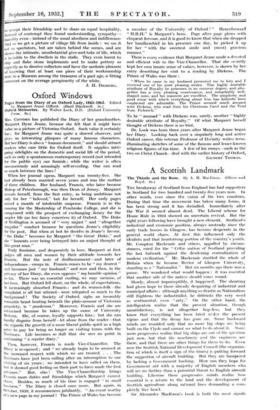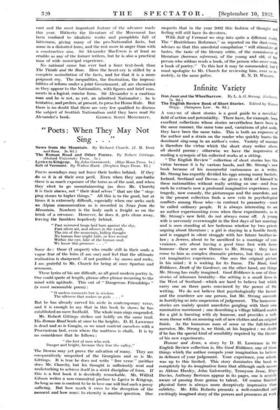A Scottish Landmark TI1E breakaway of Scotland from England has
had supporters in Scotland for two hundred and twenty-five years now. In other words, ever since the union of the two countries. During that time the movement has taken many forms, it has been strong and it has dwindled. Immediately after the War it seemed almost dead. The Liberal scheme for Home Rule in 1924 showed an uncertain revival. But the eight Years following have brought a new element. Scotland's industrial and economic position, always unsteady since the early trade booms in Glasgow, has become desperate in the general world chaos. At first this influenced only the idealists and that heartstrong portion of the country's youth. Mr. Compton Mackenzie and others, appalled by circum- stances, cried for the "Celtic nation of Scotland providing the last bulwark against the deadening centralization of modern civilization." Mr. Mackenzie startled the whole of Britain when he became Rector of Glasgow University, standing as a" Nationalist." But six months ago there was a pause. We wondered what would happen : it was essential that another side of the nation should come round.
Slowly, almost imperceptibly, it happened. The shouting had given hope to those already despairing of industrial and municipal affairs ; although anything so drastic as Nationalism still frightens the industrialist, he distrusts the very word as sentimental, even " arty." On the other hand, the intelligentsia realize that the present situation, though unsatisfactory, is not altogether hopeless, but they know that everything has been tried order the present regime and that the decay has gone on. Some backward minds are troubled only that no more big ships are being built on the Clyde and cannot see what to do about it. Some more progressive realize that big ships are out of the question just now, but that the machinery and the engineers are there, and that there are other things for them to do. Even now the Scottish National Development Council (the organiza- tion of which is itself a sign of the times) is putting forward the suggestion of aircraft building. But they are hampered by lacking a Government backing. How can they hope for Government aid with a majority of English members who will see no further than a potential threat to English aircraft building. Likewise these progressive minds realize how essential is a return to the land and the development of Scottish agriculture along rational lines demanding a com- pletely free hand.
Sir Alexander 14iacEwen's book is both the most signifi. cant and the most important feature of the advance made this year. Hitherto the literature of the Movement has been confined to idealistic works and pamphlets full of bitterness, giving many of the pro-Nationalist facts, but some in a distorted form, and the rest more in anger than with a constructive aim. Sir Alexander MacEwen is at least as erudite as any of the former writers, but he is also a practical man of wide municipal experience.
No national cause has ever had a finer text-book than The Thistle and the Rose. Here the heart-cry is stilled by a complete assimilation of the facts, and for that it is a more poignant cry. The inequalities, the frustration, the impossi- bilities of reform under a joint Government, all are chronicled as they appear to the Nationalists, with figures and brief com- ments in a logical, concise form. Sir Alexander is a cautious man and he is not, as yet, an admitted Nationalist ; he is tentative, and prefers, at present, to press for Home Rule. But there is no doubt that there are very few qualified to discuss the subject of Scottish Nationalism until they have read Sir































 Previous page
Previous page